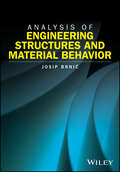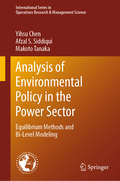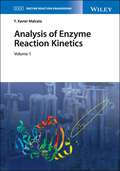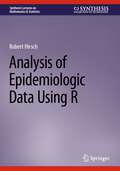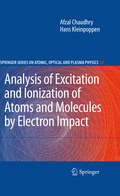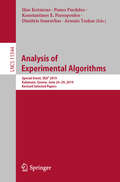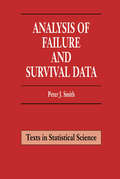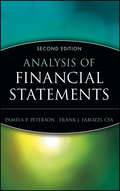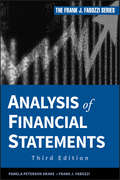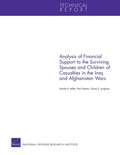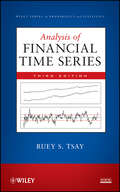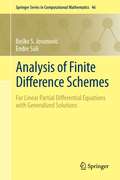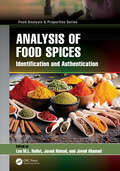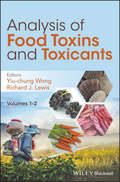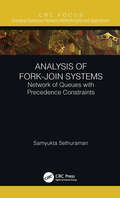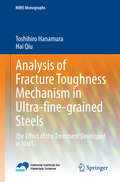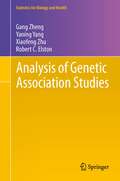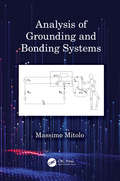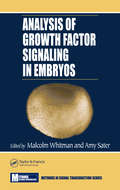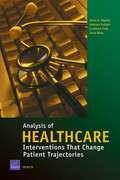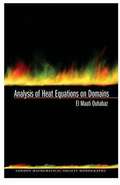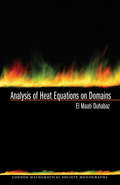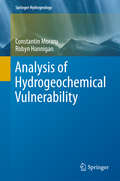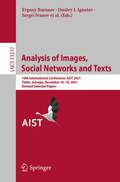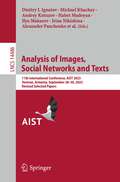- Table View
- List View
Analysis of Engineering Structures and Material Behavior
by Josip BrnicAnalysis of Engineering Structures and Material Behavior Professor Josip Brnic, University of Rijeka, Croatia Theoretical and experimental study of the mechanical behavior of structures under load Analysis of Engineering Structures and Material Behavior is a textbook covering introductory and advanced topics in structural analysis. It begins with an introduction to the topic, before covering fundamental concepts of stress, strain and information about mechanical testing of materials. Material behaviors, yield criteria and loads imposed on the engineering elements are also discussed. The book then moves on to cover more advanced areas including relationships between stress and strain, rheological models, creep of metallic materials and fracture mechanics. Finally, the finite element method and its applications are considered. Key features: Covers introductory and advanced topics in structural analysis, including load, stress, strain, creep, fatigue and finite element analysis of structural elements. Includes examples and considers mathematical formulations. A pedagogical approach to the topic. Analysis of Engineering Structures and Material Behavior is suitable as a textbook for structural analysis and mechanics courses in structural, civil and mechanical engineering, as well as a valuable guide for practicing engineers.
Analysis of Environmental Policy in the Power Sector: Equilibrium Methods and Bi-Level Modeling (International Series in Operations Research & Management Science #292)
by Afzal S. Siddiqui Yihsu Chen Makoto TanakaThis book covers game-theoretic approaches to analyzing policies for environmental regulation in the power sector. The scope includes operational and investment decisions in imperfectly competitive electricity markets as well as transmission planning and policy design. Given this context, this book synthesizes equilibrium and bi-level modeling to address challenging research questions such as: • How are power-plant operations affected by carbon policy, such as cap-and-trade (C&T) systems? • How does market power in electricity generation affect market outcomes and CO2 emissions? • How does a strategic firm with first-mover advantage manipulate both electricity and C&T permit prices? • How does a strategic firm with first-mover advantage invest in new generation capacity under a C&T system? • How does sustainable transmission planning adapt to an imperfectly competitive power sector? • How should a renewable portfolio standard (RPS) target be revised in an imperfectly competitive power sector? This book includes plenty of illustrative examples to facilitate the concepts’ comprehension. It is intended to make equilibrium and bi-level models adapted for policy assessment accessible to graduate students, academic researchers, industry practitioners, and policy analysts.
Analysis of Enzyme Reaction Kinetics (Enzyme Reaction Engineering)
by F. Xavier MalcataComprehensively introduces readers to modelling of rate of enzymatic reactions, including effects of physicochemical parameters Analysis of Enzyme Reaction Kinetics is the second set in a unique eleven-volume collection on Enzyme Reactor Engineering. It describes rate expressions pertaining to enzymatic reactions, including modulation by physicochemical factors, as well as tools for prediction and control of how fast substrates are transformed to products. Volume 1 details rate expressions mathematically derived from mechanistic postulates, and is complemented by appropriate statistical approaches to fit them to experimental data. Volume 2 discusses the effects of physical and chemical parameters upon the rates of both enzyme-catalyzed and enzyme-deactivation reactions. Starting with basic concepts and historical perspectives, the first volume introduces readers to the mathematics of rate expressions. It then goes on to cover kinetic features and the many forms of Michaelis & Menten’s-type rate expressions (single and multiple enzymes, autocatalysis, single and multiple substrates, multiphasic systems, etc.), and concludes with the statistical analysis of rate expressions – including the assessment of data, fitting of models to data, and generation of data themselves. The second volume introduces readers to physicochemical modulation of reaction rate – starting with basic concepts, and looking specifically at temperature-, mechanical force-, pH- and compound-driven effects: both unimodal and bimodal deactivation are considered. Analysis of Enzyme Reaction Kinetics 2V Set is a comprehensive work for those studying or working with enzyme reactions, or practitioners involved in the control of reactors. SERIES INFORMATION Enzyme Reactor Engineering is organized into four major sets: Enzyme Reaction Kinetics and Reactor Performance; Analysis of Enzyme Reaction Kinetics; Analysis of Enzyme Reactor Performance; and Mathematics for Enzyme Reaction Kinetics and Reaction Performance.
Analysis of Epidemiologic Data Using R (Synthesis Lectures on Mathematics & Statistics)
by Robert HirschThis book addresses the description and analysis of occurrence data frequently encountered in epidemiological studies. With the occurrence of Covid-19, people have been exposed to the analysis and interpretation of epidemiological data. To be informed consumers of this information, people need to understand the nature and analysis of these data. Effort is made to emphasize concepts rather than mathematics. Subjects range from description of the frequencies of disease to the analysis of associations between the occurrence of disease and exposure. Those analyses begin with simple associations and work up to complex relationships that involve the control of extraneous characteristics. Analyses rely on the statistical software R, which is freeware in wide use by professional epidemiologists and other scientists.
Analysis of Excitation and Ionization of Atoms and Molecules by Electron Impact (Springer Series on Atomic, Optical, and Plasma Physics #60)
by Afzal Chaudhry Hans KleinpoppenThe content of this book describes in detail the results of the present measurements of the partial and total doubly differential cross sections for the multiple-ionization of rare gas atoms by electron impact. These measurements show, beside other trends, the role of Auger transitions in the production of multiply ionized atoms in the region where the incident electron energy is sufficient to produce inner shell ionization. Other processes like Coster-Kronig transitions and shake off also contribute towards increasing the charge of the ions. The incident electron having energy of 6 keV, for example, in a collision with xenon atom can remove up to nine electrons! (*) X-ray-ion coincidence spectroscopy of the electron xenon atom collisions is also described. The present measurements of doubly differential cross sections for the dissociative and non-dissociative ionization of hydrogen, sulfur dioxide and sulfur hexa fluoride molecular gases by electron impact are also described in the text of this book. The results of the measurements for sulfur dioxide molecule show how this major atmospheric pollutant can be removed from the atmosphere by electron impact dissociation of this molecule. The present results of the measurements for sulfur hexa fluoride give an insight into the dissociation properties of this molecular gas, which is being so widely used as a gaseous insulator in the electrical circuits. The book also describes the present measurements of the polarization parameters of the fluorescence radiation emitted by the electron-impact-excited atoms of sodium and potassium. In these investigations the target atoms are polarized, therefore, the measurements of the polarization parameters give information about the electron atom interaction in terms of the interference, direct and exchange interaction channels.
Analysis of Experimental Algorithms: Special Event, SEA² 2019, Kalamata, Greece, June 24-29, 2019, Revised Selected Papers (Lecture Notes in Computer Science #11544)
by Panos Pardalos Ilias Kotsireas Konstantinos E. Parsopoulos Dimitris Souravlias Arsenis TsokasThis book constitutes the refereed post-conference proceedings of the Special Event on the Analysis of Experimental Algorithms, SEA² 2019, held in Kalamata, Greece, in June 2019.The 35 revised full papers presented were carefully reviewed and selected from 45 submissions. The papers cover a wide range of topics in both computer science and operations research/mathematical programming. They focus on the role of experimentation and engineering techniques in the design and evaluation of algorithms, data structures, and computational optimization methods.
Analysis of Failure and Survival Data (Chapman & Hall/CRC Texts in Statistical Science)
by Peter J. Smith<p>Analysis of Failure and Survival Data is an essential textbook for graduate-level students of survival analysis and reliability and a valuable reference for practitioners. It focuses on the many techniques that appear in popular software packages, including plotting product-limit survival curves, hazard plots, and probability plots in the context of censored data. <p>The author integrates S-Plus and Minitab output throughout the text, along with a variety of real data sets so readers can see how the theory and methods are applied. He also incorporates exercises in each chapter that provide valuable problem-solving experience. In addition to all of this, the book also brings to light the most recent linear regression techniques. Most importantly, it includes a definitive account of the Buckley-James method for censored linear regression, found to be the best performing method when a Cox proportional hazards method is not appropriate. <p>Applying the theories of survival analysis and reliability requires more background and experience than students typically receive at the undergraduate level. Mastering the contents of this book will help prepare students to begin performing research in survival analysis and reliability and provide seasoned practitioners with a deeper understanding of the field.</p>
Analysis of Financial Statements
by Frank J. Fabozzi Pamela P. PetersonRevised and up to date, the Second Edition includes valuable information that addresses questions such as: * What is transparency and why do we care? * How can financial statements inform investors? * How can financial statements mislead investors? * How has the Sarbanes-Oxley Act changed companies' financial disclosures? * What should you look for in financial disclosures when judging a company's financial health? * How do financial statements relate to the value of a company's stock? * Why is cash flow so important to a company's financial health? Throughout Analysis of Financial Statements, Second Edition, the authors demonstrate the nuts and bolts of financial analysis by applying the techniques to actual companies. The authors set the stage for financial analysis in Part One with their discussions of financial statements and the quality of financial statements. In Part Two, they walk you through how to judge a company's financial health using financial disclosures in financial ratio analysis, earnings analysis, and cash flow analysis. In Part Three, the authors take analysis a step further by discussing how investors and creditors can use financial statements to more effectively assess a company's performance and risk. Peterson and Fabozzi wrap up this Second Edition with a set of lessons for investors and analysts: Lesson 1: Understand what you are looking at Lesson 2: Read the fine print Lesson 3: If it's too good to be true, it may be Lesson 4: Follow the money Lesson 5: Understand the risks
Analysis of Financial Statements
by Frank J. Fabozzi Pamela Peterson DrakeThe fully update Third Edition of the most trusted book on financial statement analysis Recent financial events have taught us to take a more critical look at the financial disclosures provides by companies. In the Third Edition of Analysis of Financial Statements, Pamela Peterson-Drake and Frank Fabozzi once again team up to provide a practical guide to understanding and interpreting financial statements. Written to reflect current market conditions, this reliable resource will help analysts and investors use these disclosures to assess a company's financial health and risks. Throughout Analysis of Financial Statements, Third Edition, the authors demonstrate the nuts and bolts of financial analysis by applying the techniques to actual companies. Along the way, they tackle the changing complexities in the area of financial statement analysis and provide an up-to-date perspective of new acts of legislation and events that have shaped the field. Addresses changes to U. S. and international accounting standards, as well as innovations in the areas of credit risk models and factor models Includes examples, guidance, and an incorporation of information pertaining to recent events in the accounting/analysis community Covers issues of transparency, cash flow, income reporting, and much more Whether evaluating a company's financial information or figuring valuation for M&A's, analyzing financial statements is essential for both professional investors and corporate finance executives. The Third Edition of Analysis of Financial Statements contains valuable insights that can help you excel at this endeavor.
Analysis of Financial Support to the Surviving Spouses and Children of Casualties in the Iraq and Afghanistan Wars
by Paul Heaton David S. Loughran Amalia R. MillerExamines how the death of service members affects the subsequent labor market earnings of surviving spouses and the extent to which survivor benefits provided by the Department of Defense, the Department of Veterans Affairs, and the Social Security Administration compensate for lost household earnings. Also assesses the extent to which payments surviving spouses and children receive compensate for earnings losses attributable to combat death.
Analysis of Financial Time Series
by Ruey S. TsayThis book provides a broad, mature, and systematic introduction to current financial econometric models and their applications to modeling and prediction of financial time series data. It utilizes real-world examples and real financial data throughout the book to apply the models and methods described. The author begins with basic characteristics of financial time series data before covering three main topics: Analysis and application of univariate financial time series The return series of multiple assets Bayesian inference in finance methods Key features of the new edition include additional coverage of modern day topics such as arbitrage, pair trading, realized volatility, and credit risk modeling; a smooth transition from S-Plus to R; and expanded empirical financial data sets. The overall objective of the book is to provide some knowledge of financial time series, introduce some statistical tools useful for analyzing these series and gain experience in financial applications of various econometric methods.
Analysis of Finite Difference Schemes: For Linear Partial Differential Equations with Generalized Solutions (Springer Series in Computational Mathematics #46)
by Endre Süli Boško S. JovanovićThis book develops a systematic and rigorous mathematical theory of finite difference methods for linear elliptic, parabolic and hyperbolic partial differential equations with nonsmooth solutions. Finite difference methods are a classical class of techniques for the numerical approximation of partial differential equations. Traditionally, their convergence analysis presupposes the smoothness of the coefficients, source terms, initial and boundary data, and of the associated solution to the differential equation. This then enables the application of elementary analytical tools to explore their stability and accuracy. The assumptions on the smoothness of the data and of the associated analytical solution are however frequently unrealistic. There is a wealth of boundary - and initial - value problems, arising from various applications in physics and engineering, where the data and the corresponding solution exhibit lack of regularity. In such instances classical techniques for the error analysis of finite difference schemes break down. The objective of this book is to develop the mathematical theory of finite difference schemes for linear partial differential equations with nonsmooth solutions. Analysis of Finite Difference Schemes is aimed at researchers and graduate students interested in the mathematical theory of numerical methods for the approximate solution of partial differential equations.
Analysis of Food Spices: Identification and Authentication (ISSN)
by Javed Ahmad Javed Ahamad Nollet, Leo M.L.Spices are obtained from natural sources, especially from plants, and are used in cooking food in whole or grounded forms mainly for imparting flavor, aroma, and piquancy. Besides their role in improving food quality, spices also have health benefits that are anticancer, antidiabetic, antimicrobial, antioxidant, hypolipidemic, analgesic, immunostimulant, and more.Spices are generally marketed in powder form, and their supply chain is very long and complicated, which is why they are particularly susceptible to adulteration at many points. The spice supply chain is considered to be moderately vulnerable and has an ineffective quality detection system in its final product, which is the main risk factor. There are many types of fraud nowadays related to spices such as adulteration, falsification, substitution, and inaccurate labeling.Analysis of Food Spices: Identification and Authentication provides an overview of spices of different categories, such as terpenes and terpenoids, oleoresins, alkaloids, and polyphenolics and flavonoids, as well as qualitative and quantitative guidelines for ensuring their quality and safety using modern analytical tools and techniques. The first section of the book discusses the overview, sources, and health benefits of important categories of spices such as terpenes and terpenoids (cardamom, cinnamon, clove, coriander, cumin, fennel), oleoresins (capsicum, ginger, nutmeg), alkaloids (black pepper, fenugreek), and polyphenolics and flavonoids (basil, turmeric, olive, saffron). In the second section, qualitative diagnostic features of spices are covered. In the third section, the roles of quantitative analytical techniques, such as HPLC, LC-MS, HPTLC, GC, and GC-MS, capillary electrophoresis (CE), and other recent techniques in the analysis of food spices, are also discussed. Each chapter concludes with a general reference section, which is a bibliographic guide to more advanced texts.Key Features Provides a detailed overview of different food spices of plant origin, and discusses their health benefits and uses of different analytical techniques in its quality control Explains how qualitative diagnostic features of food spices are utilized as quality control tools Describes applicability of analytical techniques like HPLC, LC-MS, GC-MS, HPTLC, and CE for quality control of food spices Emphasizes use of recent techniques such as proteomics, biosensors, and more in the analysis/quality control of food spices This book will provide important guidelines for controlling quality, safety, and efficacy issues related to food spices.
Analysis of Food Toxins and Toxicants
by Richard J. Lewis Yiu-Chung WongAnalysis of Food Toxins and Toxicants consists of five sections, providing up-to-date descriptions of the analytical approaches used to detect a range of food toxins. Part I reviews the recent developments in analytical technology including sample pre-treatment and food additives. Part II covers the novel analysis of microbial and plant toxins including plant pyrrolizidine alkaloids. Part III focuses on marine toxins in fish and shellfish. Part IV discusses biogenic amines and common food toxicants, such as pesticides and heavy metals. Part V summarizes quality assurance and the recent developments in regulatory limits for toxins, toxicants and allergens, including discussions on laboratory accreditation and reference materials.
Analysis of Fork-Join Systems: Network of Queues with Precedence Constraints (Emerging Operations Research Methodologies and Applications)
by Samyukta SethuramanWith the boom of big data and machine learning and the subsequent need for parallel processing technologies, fork-join queues are more relevant now than ever before. In this book, new estimates of the average response time in fork-join queues are proposed, which form the basis for new research opportunities. Analysis of Fork-Join Systems: Network of Queues with Precedence Constraints explores numerical approaches to estimate the average response time of fork-join queueing networks and offers never before published simple expressions for the mean response time as conjectures. Extensive experiments are included to demonstrate the remarkable accuracy of the conjectures and algorithms used in the estimation of the average response time. Graduate students, professors, and researchers in the fields of operations research, management science, industrial engineering, computer science, and electrical engineering will find this book very useful. Students, as well as researchers in both academia and industry, will also find this book of great help when looking for results related to fork-join queues
Analysis of Fracture Toughness Mechanism in Ultra-fine-grained Steels: The Effect of the Treatment Developed in NIMS (NIMS Monographs)
by Toshihiro Hanamura Hai QiuIn this book, advanced steel technologies mainly developed at the National Institute for Materials Science (NIMS), Japan, for structure control, mechanical properties, and the related mechanisms are introduced and discussed. NIMS has long worked on developing advanced steel techniques, namely, producing advanced steels by using only simple alloying elements such as carbon, manganese, and silicon, and also by utilizing steel scrap. The hope is that this approach will lead to a technology of a so-called steel-to-steel recycling process, with the ultimate goal of a recycling process such as an automotive-steel-to-automotive-steel recycling process to take the place of the current cascade-type recycling system. The main idea is to utilize ultra-grain refining structures and hetero structures as well as martensite structures. In particular, the focus of this book is on tensile strength and toughness of advanced steels from both the fundamental and engineering points of view. Fundamentally, a unique approach to analysis is taken, based on fracture surface energy as effective grain size is employed to better understand the mechanism of property improvement. From the engineering point of view, in fracture toughness such factors as crack tip opening displacement (CTOD) of advanced steels are evaluated in comparison with those of conventional steels.
Analysis of Genetic Association Studies (Statistics for Biology and Health)
by Gang Zheng Xiaofeng Zhu Yaning Yang Robert C. ElstonAnalysis of Genetic Association Studies is both a graduate level textbook in statistical genetics and genetic epidemiology, and a reference book for the analysis of genetic association studies. Students, researchers, and professionals will find the topics introduced in Analysis of Genetic Association Studies particularly relevant. The book is applicable to the study of statistics, biostatistics, genetics and genetic epidemiology. In addition to providing derivations, the book uses real examples and simulations to illustrate step-by-step applications. Introductory chapters on probability and genetic epidemiology terminology provide the reader with necessary background knowledge. The organization of this work allows for both casual reference and close study.
Analysis of Grounding and Bonding Systems
by Massimo MitoloLearn the theory behind grounding systems and bonding equipotential connections from a worldwide expert. Through mathematical analysis, comprehensive explanations, and detailed figures, Analysis of Grounding and Bonding Systems explains the theory and the reasons behind basic ground-electrodes (i.e., the sphere, the ground rod, and the horizontal ground wire), and more complex grounding systems (i.e., ground-grids), buried in uniform and non-uniform soils. Through calculations and explanatory diagrams, this comprehensive guide provides code-complying solutions for the safety against electric shock provided by equipotential bonding connections between exposed-conductive-parts, such as equipment enclosures, and metalwork. Details on the calculation of step and touch voltages in different types of system grounding (i.e., TT, TN, and IT) are provided, also with the aid of solved problems. Readers will learn how to minimize hazardous interactions between grounding systems, cathodically protected pipelines, and heat networks. The analysis of the effectiveness of bonding systems against electric shock in the case of contact with electric vehicles during charge in the event of ground-faults, which is an upcoming issue challenging our safety, is included.
Analysis of Growth Factor Signaling in Embryos (Methods in Signal Transduction Series)
by Malcolm Whitman Amy K. SaterDevelopmental biologists have been driven to investigate growth factor signaling in embryos in order to understand the regulatory mechanisms underlying a given developmental process. Thus, it is critical to explore the technical methods and experimental designs for growth factor signaling in embryos.Focusing on specific pathways or pathway comp
Analysis of Healthcare Interventions that Change Patient Trajectories
by Katya Fonkych James H. Bigelow Constance Fung Jason WangExamines interventions in the healthcare system that use Electronic Medical Record Systems (EMR-S) to affect patient trajectories--i.e., the sequence of encounters a patient has with the healthcare system--by improving health and thereby reducing healthcare utilization, or by reducing a costly form of utilization (e.g., inpatient stays) and increasing a more economical form (e.g., office visits to physicians, or prescription medications).
Analysis of Heat Equations on Domains
by El Maati OuhabazThis is the first comprehensive reference published on heat equations associated with non self-adjoint uniformly elliptic operators. The author provides introductory materials for those unfamiliar with the underlying mathematics and background needed to understand the properties of heat equations. He then treats Lp properties of solutions to a wide class of heat equations that have been developed over the last fifteen years. These primarily concern the interplay of heat equations in functional analysis, spectral theory and mathematical physics. This book addresses new developments and applications of Gaussian upper bounds to spectral theory. In particular, it shows how such bounds can be used in order to prove Lp estimates for heat, Schrödinger, and wave type equations. A significant part of the results have been proved during the last decade. The book will appeal to researchers in applied mathematics and functional analysis, and to graduate students who require an introductory text to sesquilinear form techniques, semigroups generated by second order elliptic operators in divergence form, heat kernel bounds, and their applications. It will also be of value to mathematical physicists. The author supplies readers with several references for the few standard results that are stated without proofs.
Analysis of Heat Equations on Domains. (LMS-31)
by El-Maati OuhabazThis is the first comprehensive reference published on heat equations associated with non self-adjoint uniformly elliptic operators. The author provides introductory materials for those unfamiliar with the underlying mathematics and background needed to understand the properties of heat equations. He then treats Lp properties of solutions to a wide class of heat equations that have been developed over the last fifteen years. These primarily concern the interplay of heat equations in functional analysis, spectral theory and mathematical physics.This book addresses new developments and applications of Gaussian upper bounds to spectral theory. In particular, it shows how such bounds can be used in order to prove Lp estimates for heat, Schrödinger, and wave type equations. A significant part of the results have been proved during the last decade.The book will appeal to researchers in applied mathematics and functional analysis, and to graduate students who require an introductory text to sesquilinear form techniques, semigroups generated by second order elliptic operators in divergence form, heat kernel bounds, and their applications. It will also be of value to mathematical physicists. The author supplies readers with several references for the few standard results that are stated without proofs.
Analysis of Hydrogeochemical Vulnerability (Springer Hydrogeology)
by Robyn Hannigan Constantin MoraruThis monograph instructs the reader on how to analyze the hydrogeochemical vulnerability. It introduces notions of geochemical signals, points of migration of pollutants in the unsaturated zone, and new hydrogeochemical classifications. Three test sites in the USA, Germany, and Moldova are described as case studies accompanied by illustrative data. The authors presuppose for future readers only the background mathematics and elementary knowledge of hydrogeology. The presented methodology is both for local and regional assessments. It is simple, does not need implication of high qualification specialists and can be applied to test the groundwater quality. The book is useful for undergraduate, graduate, master, and PhD students as well as water quality specialists, ecologists and geology professionals.
Analysis of Images, Social Networks and Texts: 10th International Conference, AIST 2021, Tbilisi, Georgia, December 16–18, 2021, Revised Selected Papers (Lecture Notes in Computer Science #13217)
by Panos M. Pardalos Andrey V. Savchenko Dmitry I. Ignatov Olessia Koltsova Jari Saramäki Alexander Panchenko Michael Khachay Natalia Loukachevitch Sergei O. Kuznetsov Amedeo Napoli Elena Tutubalina Evgeny Burnaev Sergei Ivanov Andrei Kutuzov Evgenii TsymbalovThis book constitutes revised selected papers from the thoroughly refereed proceedings of the 10th International Conference on Analysis of Images, Social Networks and Texts, AIST 2021, held in Tbilisi, Georgia, during December 16–18, 2021. The 20 full papers and 5 short papers included in this book were carefully reviewed and selected from 118 submissions. They were organized in topical sections as follows: Invited papers; natural language processing; computer vision; data analysis and machine learning; social network analysis; and theoretical machine learning and optimization.
Analysis of Images, Social Networks and Texts: 11th International Conference, AIST 2023, Yerevan, Armenia, September 28–30, 2023, Revised Selected Papers (Lecture Notes in Computer Science #14486)
by Panos M. Pardalos Andrey V. Savchenko Dmitry I. Ignatov Alexander Panchenko Michael Khachay Andrey Kutuzov Elena Tutubalina Ilya Makarov Evgenii Tsymbalov Habet Madoyan Irina Nikishina Maxim Panov Sergey ZagoruykoThis book constitutes revised selected papers from the thoroughly refereed proceedings of the 11th International Conference on Analysis of Images, Social Networks and Texts, AIST 2023, held in Yerevan, Armenia, during September 28-30, 2023. The 24 full papers included in this book were carefully reviewed and selected from 93 submissions. They were organized in topical sections as follows: natural language processing; computer vision; data analysis and machine learning; network analysis; and theoretical machine learning and optimization. The book also contains one invited talk in full paper length.
